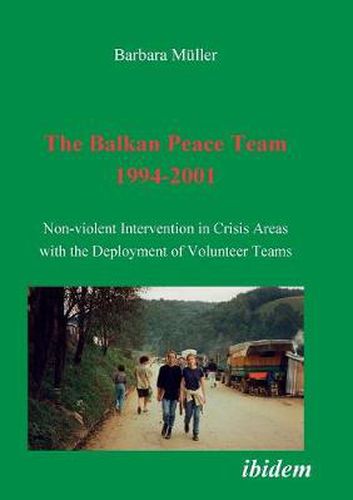Readings Newsletter
Become a Readings Member to make your shopping experience even easier.
Sign in or sign up for free!
You’re not far away from qualifying for FREE standard shipping within Australia
You’ve qualified for FREE standard shipping within Australia
The cart is loading…






This title is printed to order. This book may have been self-published. If so, we cannot guarantee the quality of the content. In the main most books will have gone through the editing process however some may not. We therefore suggest that you be aware of this before ordering this book. If in doubt check either the author or publisher’s details as we are unable to accept any returns unless they are faulty. Please contact us if you have any questions.
Jorgen Johansen (Peace Activist, Trainer and Researcher, with expertise in the conflicts in Colombia, India, Congo, Cameron, China, Palestine, Israel, Indonesia, and other areas) writes on this book: The international peace movement changed its strategy in the early nineties. From mainly working in their own countries members moved into the war zones in large numbers. This had been done earlier, but not on such a large scale. The new context rendered most of their experiences out of date. Many tried and some failed. It was obviously not enough to be armed with good intentions. What was functioning well outside US Embassies or in their home constituencies could not be copied on the battlefields. In order to learn from these new types of intervention and improve organisation for coming campaigns, it is crucial to soberly evaluate newly gained experience. Barbara Muller has studied the Balkan Peace Team and its work in Croatia, Serbia and Kosovo. The present book presents a critical and thorough evaluation of this important project. In a true ‘Gandhian’ tradition, the author takes the reader on a tour through this experiment with the truth . This is far from being a list of ovations for the volunteers who spent years in the Balkans doing their best. The most useful parts of the present book are the detailed descriptions of the complexity and difficulties facing such projects. Organised by a number of peace organisations from different backgrounds and cultures, and run by a similar diversity of people each in their own particular field, it should not come as a surprise to anyone to realise that the difficulties were numerous. And to work in a war zone obviously adds to the list of challenges. All in all, the Balkan Peace Team did a great job and it deserves the recognition found in this detailed documentation and critical examination. No organisation should venture to plan such a project without first reading this important book. Neither should any volunteers be sent to a conflict area without having this book on their obligatory assignments list.
$9.00 standard shipping within Australia
FREE standard shipping within Australia for orders over $100.00
Express & International shipping calculated at checkout
This title is printed to order. This book may have been self-published. If so, we cannot guarantee the quality of the content. In the main most books will have gone through the editing process however some may not. We therefore suggest that you be aware of this before ordering this book. If in doubt check either the author or publisher’s details as we are unable to accept any returns unless they are faulty. Please contact us if you have any questions.
Jorgen Johansen (Peace Activist, Trainer and Researcher, with expertise in the conflicts in Colombia, India, Congo, Cameron, China, Palestine, Israel, Indonesia, and other areas) writes on this book: The international peace movement changed its strategy in the early nineties. From mainly working in their own countries members moved into the war zones in large numbers. This had been done earlier, but not on such a large scale. The new context rendered most of their experiences out of date. Many tried and some failed. It was obviously not enough to be armed with good intentions. What was functioning well outside US Embassies or in their home constituencies could not be copied on the battlefields. In order to learn from these new types of intervention and improve organisation for coming campaigns, it is crucial to soberly evaluate newly gained experience. Barbara Muller has studied the Balkan Peace Team and its work in Croatia, Serbia and Kosovo. The present book presents a critical and thorough evaluation of this important project. In a true ‘Gandhian’ tradition, the author takes the reader on a tour through this experiment with the truth . This is far from being a list of ovations for the volunteers who spent years in the Balkans doing their best. The most useful parts of the present book are the detailed descriptions of the complexity and difficulties facing such projects. Organised by a number of peace organisations from different backgrounds and cultures, and run by a similar diversity of people each in their own particular field, it should not come as a surprise to anyone to realise that the difficulties were numerous. And to work in a war zone obviously adds to the list of challenges. All in all, the Balkan Peace Team did a great job and it deserves the recognition found in this detailed documentation and critical examination. No organisation should venture to plan such a project without first reading this important book. Neither should any volunteers be sent to a conflict area without having this book on their obligatory assignments list.